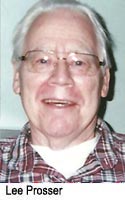|
[an error occurred while processing this directive]
|
June 1, 2005
Bide One's TimeWe are Each a Living Ghost in Our Own StoryBy Lee Prosser  When I think of ghosts, I oftentimes reflect on American fiction writers because Americans have written about them in one form or another for a long time. Whether looking at early American authors or contemporary ones, the theme of ghost is there. When I think of ghosts, I oftentimes reflect on American fiction writers because Americans have written about them in one form or another for a long time. Whether looking at early American authors or contemporary ones, the theme of ghost is there.But what about this idea, something I have been mulling over for years: What if all literature is about ghosts, just essentially that. For instance, look at the writings of Ernest Hemingway, William Faulkner, Edith Wharton, Pearl Buck, Edna Ferber, Carson McCullers, John Steinbeck, Henry Miller, Mark Twain, Paul Bowles, or F. Scott Fitzgerald. The era they wrote about is dead. The characters and the actions of the characters are long ago, and dead. When you read a book by one of those writers, you are reading about a dead era and dead characters of that era. You are, then, in the long and the short of it, reading about the dead. Fifty years past the death of Stephen King and John Grisham, the same approach applies fully, for the reader of that time will be reading about the era of our time and consequently reading about ghosts. The living reflecting upon the way we were. This idea can be applied to writers everywhere, past and present and other than American authors. Take a look at the writings of Albert Camus, Christopher Isherwood, Shakespeare, or Charles Dickens, or any author male or female that catches your personal interest! Recently I completed reading the entire works of American author, Herbert Gold. I discovered that in reading his fine novels, short stories, and nonfiction, I could understand better the beauty of an era in which I was still living in. His literate writings reflect the mores, culture, times, and emotions of your era, my era, our era. His universal perspective examines the themes of the era we are connected to. I recall during the 1970s corresponding with Gold on matters concerning writing and characterizations. A charming, kind man, he answered, and I took his advice. For those interested in Herbert Gold, who is a genuine American storyteller and recorder of an era, take a look at this website: www.ohioreadingroadtrip.org/gold/ You will not be disappointed in what you discover! Among Gold's numerous writings are the novels The Man Who Was Not With It, Salt, Fathers, Waiting for Cordelia, A Girl of Forty, Dreaming, Daughter Mine, and She Took My Arm As If She Loved Me. Gold's short story and essay collections include Love and Like, The Age of Happy Problems, and Lovers and Cohorts. His nonfiction writings include: My Last Two Thousand Years, A Walk on the West Side: California on the Brink, Best Nightmare on Earth: A Life in Haiti, and Bohemia: Where Art, Angst, Love, and Strong Coffee Meet. Examine the ghosts found within Herbert Gold's intimate and complex writings. You will see what I mean about ghosts. Then apply my theory of ghosts to the writings of your favorite writer, American or otherwise, and make the connection. What a wonderful world it is we read about and live in, including all of its sweetness, horrors, down and out craziness, pain, terror, compassion, mercy, and love. We are each a living ghost in our own story, soon to pass on to make room for others. We each have our own remarkable passage to undertake, come what may on our way to becoming tomorrow's ghost.
Lee Prosser is Ghostvillage.com's book reviewer and a
regular contributor. "Bide One's Time" is Prosser's twice-monthly column on his supernatural musings.
| | ||||||



